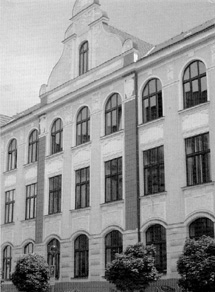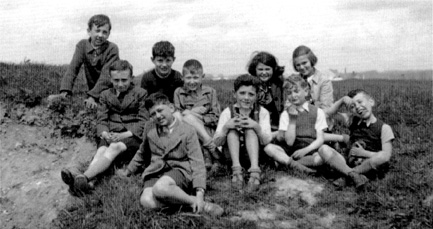
One morning, John walked the two blocks to his school with his head down, wondering what the day would be like. His was a boys’ school; there were no girls. And John was the only Jewish child in his class. That didn’t bother him very much. Aside from Beda and a few others, most of John’s friends were not Jewish. The children played easily together, not thinking about their religious differences.
John entered his classroom and looked around. His teacher was already at the blackboard, writing out the lessons for the day. He was a kind man who had taught John in several grades. He nodded as John walked over to his desk and sat down on the narrow wooden bench. Three boys sat next to each other at each bench, with a long desktop in front of them. Zdenek was already there, busily writing down the lessons from the blackboard.
Zdenek Svec (pronounced Shvets) was John’s good friend. They had known each other since they were five years old, having met and become instant friends in kindergarten. Zdenek lived with his parents and sister, Mana, in a small apartment on the main floor of a nearby high school, where his father was the superintendent. As John slid over next to his friend, Zdenek looked up and smiled.
“Come over this evening,” he whispered, glancing up to make sure the teacher did not hear.

Zdenek Svec lived in this school and played here with John in the evenings.
John nodded. He loved going over to Zdenek’s home. Zdenek’s family were kind, hard-working, hospitable people. Zdenek’s mother always had a plate of delicious cakes ready for the hungry children whenever John went over to play. And John loved playing with Zdenek in the school. Together, the boys walked through the dark corridors, chasing each other and sliding on the polished floors. There was a rope-driven elevator, mostly used for supplies and off-limits to the boys. Nevertheless, when they felt very brave, John and Zdenek ignored Mr. Svec’s orders and rode the elevator between floors. “I have to go to my Hebrew class after school,” John whispered back to Zdenek. “But I’ll come over after that.” Twice a week, John attended Hebrew classes led by Rabbi Ferda. The rabbi came to his school, and Jewish children from across town congregated for the one-hour session.
Zdenek frowned. He was not Jewish, and he didn’t understand why John had to give up some of his playtime for religious studies. “Okay,” he finally replied. “But come quickly after that.”
John turned back to his studies. He had a long day ahead, and he needed to focus on his Latin, and on mathematics and history. But on that day the children were in for a treat.
The teacher turned from the blackboard to face the class. “Children,” he said, “today is a very special day. Raise your hand if you know who Mr. Benes is.”
Everyone in the class shot up a hand. Edvard Benes (pronounced Ben-esh) was the President of Czechoslovakia. For years he had been Foreign Minister in the government of Thomas Masaryk, the country’s much-revered first president. Upon Masaryk’s retirement in 1935, Benes had assumed the leadership. “Today, President Benes will be traveling through Budejovice. Our entire class will go outside to watch his motorcade pass through town. It will be an honor for all of us to see our president in person.”
The class buzzed with excitement as the boys lined up and marched out of their classroom and out of the school. The streets were already jammed with people, young and old, waiting with anticipation. John scanned the crowd. He spotted Karel standing with a group of older children from his school, and he imagined that his parents were somewhere in the mass of people. In fact, all his friends were probably out here, waiting with the same excitement he felt. Beda, Frances, and Reina Neubauer were out there somewhere. Rabbi Ferda was likely standing with a group of people on another corner. Someone handed John the red, white, and blue flag of Czechoslovakia, and he waved it high above his head. And then, suddenly, there it was. A long, black, open-topped car rounded the corner, with a smiling president inside. Mr. Benes waved and nodded at all the people as they shouted greetings. Just as the car pulled close to John, the people around him began to sing the Czech national anthem, their voices rising in unison in tribute to their leader and their country. John, of course, joined in.

John (front) and some of the other children from Budejovice.
This was a proud day for the citizens of Budejovice. It was a day when vendors abandoned their stalls, businessmen left their offices, and mothers and babies lined up to get as close to the curbs as they could. John felt thrilled to be standing there waving his country’s flag. He felt strongly Czech in that moment, and confident of his nation’s unity. He believed that he and all the other people standing together were like one family, all proud of their country and their culture.